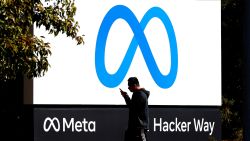Facebook on Tuesday unveiled its cryptocurrency project: Libra. If all goes to plan, the company and its partners think Libra could fundamentally change global financial and payment systems.
Here’s how it will work:
Libra is a digital currency powered by blockchain that is set to launch next year. An independent organization composed of representatives of up to 100 companies and nonprofits — not Facebook alone — will govern the currency.
Facebook (FB) and other companies will build applications for people to use Libra. For example, Facebook (FB)’s digital wallet app will plug into Whatsapp and Messenger, allowing users to send the digital currency through their message threads the same way they send a GIF.
The idea is to create a stable, digital currency that people across the globe will use on everyday transactions like buying something online or taking out bank loans. Users will also be able to send money across the world instantly and more cheaply than traditional wire transfers have allowed.
Here are three key things to know about Libra:
How big could this be?
Facebook’s reach will position Libra to gain a more mainstream audience than other cryptocurrencies have.
Nearly 35 million people worldwide now have blockchain “wallets” to hold cryptocurrency, according to a recent report from Statista. That offers a rough estimate of how many people participate in the market currently (though a single person can hold multiple wallets).
By comparison, Facebook’s global user base of 2.4 billion is massive. Facebook and partners on the project like Spotify (SPOT) are also design experts, meaning the user interfaces they create to work with Libra will likely be more user-friendly than other digital currency projects have been.
How will Facebook make money with Libra?
Facebook has created an independent subsidiary called Calibra that will manage all Libra developments and transactions for the company.
Calibra and the products it creates for users to interact with Libra will be Facebook’s way of making money on this project. For starters, the Calibra wallet app will allow users to send each other money — sometimes it will be free, and sometimes the app will charge a small fee (i.e. revenue for Facebook). Facebook has not specified when it will charge for transfers. But, that fee will still be much less than a wire transfer across the world would be and it’ll be instant.
It is already possible to transfer and spend money digitally using Venmo or Facebook Messenger’s own peer-to-peer transfer feature, but those require having a bank account and moving money back and forth from the apps to the bank. Facebook is expecting that Libra will really take off in developing countries where many people don’t have access to a bank account and Libra can offer a stable alternative to their local currencies that is easier to store and spend.
Beyond direct revenue, Libra and Calibra are also ways for Facebook to continue to make its platforms indispensable to users.
How will users’ privacy be protected?
Cryptocurrency networks have typically been built with the goal of transparency in mind. But more transparency inherently means less privacy.
The way blockchain technologies work is that every transaction made with the digital currency is recorded by each computer (or “node”) that’s plugged into the network, though it’s recorded under a pseudonym so the user’s personal information is not directly connected to the transaction.
On the Libra network, any user will be able to access that anonymized record of any transaction. But on other cryptocurrency networks, companies and governments have been able to connect a specific user with their transactions by picking up on patterns in their use of the currency.
Facebook said Calibra will not share users’ financial data with Facebook except in “limited cases” and will not use it for targeted advertising. Facebook has also said Calibra will have the same kind of verification and anti-fraud processes that banks and credit cards use.




















